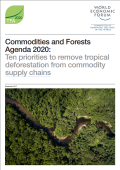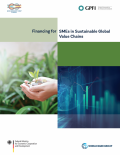
The report Financing for SMEs in Sustainable Global Value Chains demonstrates how governments, financial institutions and businesses can work together to support financing models that encourage small and medium enterprises (SMEs) to upgrade their production processes to comply with sustainability standards in global value chains (GVCs).
Part 1 explores the importance of SMEs and GVCs for emerging economies. It also examines the rise of sustainability standards and the challenges and opportunities they pose for SMEs. Part 2 reports findings from a stocktaking exercise conducted through a survey administered to governments, financial institutions, businesses and information technology platforms in G20 and non-G20 economies. Lastly, Part 3 outlines policy considerations for the various stakeholders, governments, financial institutions and businesses to develop new financing models to support sustainability-oriented SMEs in GVCSs.
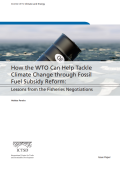
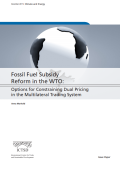
The paper Fossil Fuel Subsidy Reform in the WTO: Options for Constraining Dual Pricing in the Multilateral Trading System discusses the practice of energy dual pricing in the broader context of fossil fuel subsidy reform. The contribution explores avenues for constraining dual pricing, which is approached as a fossil fuel subsidy, within the framework of the WTO. It does so by proposing options under existing rules, as well as suggesting changes to the system beyond current rules.
The piece suggests that WTO members wishing to take action against dual-pricing policies maintained by other members could explore bringing a case to dispute settlement on the basis of specific provisions under the General Agreement on Tariffs and Trade (GATT), the Agreement on Subsidies and Countervailing Measures (ASCM) and/or the Anti-Dumping Agreement (ADA). Bringing a case would send a strong signal that dual-pricing policies are not immune to being challenged in a WTO dispute. Moreover, it is likely that this would function as a trigger to rapidly include talks on broader fossil fuel subsidy reform on the WTO agenda.
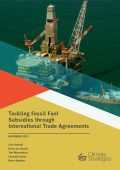
The report Tackling Fossil Fuel Subsidies through International Trade Agreements analyses the compatibility of five selected fossil fuel support measures in the Group of 20 (G20) countries with the WTO’s 1994 Agreement on Subsidies and Countervailing Measures (ASCM). The exercise has never been attempted before, and doing so, it identifies some of the key legal questions and challenges faced at the WTO.
Specifically, the findings highlight the difficulty of litigating fossil fuel consumption subsidies, measures that remain substantial. While enhanced transparency could help address some of the challenges complainants may face, fossil fuel subsidy notification rates within the WTO system remain disappointingly low.
In light of these shortcomings, the paper identifies five complementary avenues for reform of international trade policy to enable countries to better address fossil fuel subsidies:
